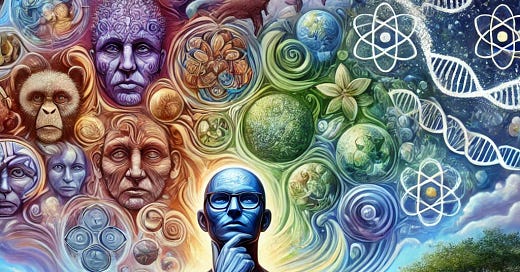Free-Thinking: Free-thinking is a specific method of thinking for oneself in which one’s fundamental basis of truth comes not from the words of others, but from one’s own firsthand experience, and one reasons from the foundation of that experience. The outcome of this then supersedes, for the person, all secondhand forms of knowledge—whether from books, teachers, traditions, religions, or hearsay.
This isn’t, however, by any means a default, instinctual mode of thinking granted by nature to all humans. The vast majority of people never become capable of free-thinking. A small minority do, but only within a limited field of knowledge (be it biology, history, painting, or economics). And only a tiny percentage become able to apply it in all areas of life. That is, however, one of the qualities found in every self-actualized person. For such individuals, this method truly becomes a commandment to “question everything,” and analyze everything, through the lens of their firsthand experience and logic.
Free-thinking is, essentially, scientific thinking—taking place in the mind of one person. It is an empirical, objective, and quintessentially correct method of independently acquiring, validating, and organizing one’s own knowledge. The same way we have the ability to cut down mature wheat plants, to leave the stalks out to dry, to extract the kernels from the stalks, to separate the chaff from the grain, to grind that grain into powder, to mix that flour with yeast and water, and to bake that dough in a hot oven, every step of which needs almost no learning, but that must all be combined in a sequential method or we would never produce bread; so do we have the cognitive functions of observation, memory, imagination, comparison, classification, logic, and abstract reasoning, which almost every grown adult is fully capable of, but that must be organized into a comprehensive method of thinking, or we couldn’t reliably extract truth from our interface with the world.
And much like for many millennia humans had only tradition, religion, and philosophy, before the discovery of science; so can each person only accept what society teaches him on authority, or on faith, or draw his own sloppily founded conclusions, before he discovers (or learns) the method of free-thinking. Yet every self-actualized person does gain this skill, and becomes able to apply it to all parts of reality. It gives him the requisite tool for using his mind to its fullest potential; and also, at least in part, his “superior ability to reason, to perceive the truth, to come to conclusions,” and “to be cognitively efficient in general,” as Maslow wrote.[i] From this, in turn, arises his independence, his creativity, his moral certainty about right and wrong, his self-understanding and self-acceptance, and his occasional capacity to generate works, discoveries, and innovations of revolutionary originality.[ii]
The above article is an exerpt from my book, On Rotting Prison Staw: The Self-Actualization of Aleksandr Solzhenitsyn. It is the most concise definition and explanation of the mode of thought that has since the Enlightenment been called “freethinking.”
[i] Maslow, Abraham, Farther Reaches of Human Nature, p 154
[ii] See: Gelperin, Roman, The Master Mind of the Self-Actualizing Person, Chapter 1






This is very good and no doubt, if everyone learned to think this way, it would be helpful
There's one major gap though (and I say this as someone trained in scientific research)
All of science is based on certain fundamental assumptions, which are not themselves based on scientific thinking.
The assumption most pervasive and most obviously wrong is that of physicalism - the idea that the world as analyzed by science is ultimately non living, non intelligent, non conscious and without meaning, purpose or direction. No scientific experiment has ever been (nor ever could be) devised to test these assumptions, simply because they are philosophic, non-empirical assumptions.